Have you ever seen an episode of a talk show where a crew completely cleans someone’s home of clutter? If the person who lives there isn’t very into it or involved (and sometimes even if they are), what usually happens? The house may look great at the end of the episode, but a few years later, when they do a follow up episode, the house is usually cluttered again. Why is that?
It’s not uncommon for the host and audience members to look irritated or disappointed and say things like, “Why did you let this happen again?” but it really boils down to this, decluttering isn’t something someone else can do for you.
People can help to physically remove things from our homes, but if we don’t address why we’re collecting clutter in the first place, the change will only be temporary because clutter isn’t about the stuff. It’s not. It’s not about the stuff, and the longer we obsess over the stuff, the longer we put off making true progress.
I guess the most basic place to start in all of this is to define what clutter is to each of us. There’s the basic definition of, “A disorderly heap,” but I think clutter is more than that. For me, clutter is chaos. It’s a suffocating presence that drains us of joy and peace and instead fills us with fear, hopelessness, shame, and anxiety.
There are many different types of clutter: mental, emotional, physical, social, even digital:
Mental or Emotional clutter are the thoughts and feelings that hold us back from our true potential. They may be tied to certain events, people, places, or memories, and they leave us feeling drained. This kind of clutter may prevent us from having happy and successful relationships or doom us to repeat unhealthy patterns. It can cause us to be stuck where we are (usually in the past) instead of fully enjoying the present or creating a great future.
Physical clutter is probably what most people think of what they think of clutter. It’s the stuff that isn’t placed where it belongs, the piles of junkmail on a kitchen counter, dirty clothes on a bedroom floor, or a stack of books and magazines on a nightstand. This clutter can drain our energy and cause us to limit social interactions out of embarrassment and fear of what others will think of our homes. We can feel weighed down and like we’re caught in a vicious cycle of never ending tasks. It can also make us feel guilty when we’re pursuing hobbies or relaxing because we feel like we should be cleaning or organizing instead.
Social clutter consists of the people and commitments who no longer add to our lives. Relationships go through ebbs and flows. Sometimes we take more than we give, sometimes we give more than we take, but when we’re constantly giving, giving, giving and receiving nothing, or worse yet mistreatment and negativity in return, it may be time to do serious work in an attempt to improve the relationshp or simply cut those people loose. It also means having a calendar so packed with commitments that you barely have time to catch your breath.
Digital clutter can be a tricky devil. It can seem organized, but a computer full of pictures, e-mails, subscriptions, files, etc. can be overwhelming. I love the ease of digital photography and the freedom to take as many pictures as my memory stick can hold, but weeding through thousands of pictures trying to find the one I’m looking for can be a nightmare. Don’t even get me started on my e-mail. The unopened ones alone exceed 20,000… I wish I was kidding.
Now, thanks to social media, digital and social clutter can overlap. We can have digital social clutter by having to too many social media accounts, friends on facebook, or belonging to too many facebook groups. This clutter causes us to be easily distracted with information that add nothing to our lives and may even leave us feeling inferior. Afterall, people tend to share their life highlights online, not their failures or clutter.
The reasons for leading cluttered lives are probably just as varied as are people on the planet. Our beliefs, experiences, and pasts all play into who we are today and why we do what we do.
Some of us have clutter because we’ve never been taught the skills or learned the discipline necessary to maintain an orderly home. Some of us have been so overwhelmed or hurt by something in life (maybe a divorce or the sudden death of a loved one) that it’s caused us to try to control our environments by keeping everything we can. We may feel that by letting go of a deceased loved one’s possessions we’re losing them all over again.
Others struggle with depression, anxiety, or various other issues that cause them to feel paralyzed or like a clean home’s just not worth the effort. Afterall, the work never really ends so what’s the point?
And sadly, some of us just don’t think we deserve any better. For some us, clutter has crept up like a slow fog that filled every nook and cranny of our homes and lives, and we just can’t see our way through or how to get out of it.
Today’s tasks:
1) Figure out (or at least attempt to answer) why you have clutter. Some people may think this is a bunch of psychobabble. I probably would have a few years ago too. “Oh, please. I’m not here for therapy. I’m here for some organizational tips. I just want a clean house!” Well, I’m not a therapist (and I don’t even play one on tv), but I do believe that self reflection is the first step to decluttering because I’ve tried the just address the stuff approach for years now, and it’s not working. I know I’m not alone.
If you’ve never thought about this before and have no idea why you have clutter, that’s okay. Just having these questions in mind over the course of the next 26 weeks will help when you’re trying to decide what to keep or get rid of.
Some questions to ask ourselves:
- How do I define clutter? How will I identify it in my own life?
- In what ways do I have mental or emotional, physical, social, and digital clutter in my life?
- What room or area of my life is most cluttered? Why?
- How does clutter hurt me? (For example, wasted time, paying late fees, negative feelings of embarrassment, guilt, shame, etc)
- How much of my time is consumed by clutter? (Acquiring and cleaning items, organizing, and trying to find things that are lost, etc)
- How does clutter make me feel?
- Do I struggle with getting rid of things?
- What items are the hardest to get rid of?
- What would an organized, uncluttered environment or life look like for me?
- How would an organized, uncluttered environment or life make me feel?
- What about my current lifestyle or habits would have to change in order to have the home I want?
Click HERE to download your copy.
2) Take pictures of your home exactly as it is right now. Capture all of the cluttered piles and closets that you wouldn’t want anyone to see. You don’t have to share these pictures if you don’t want to. You don’t even have to look at them after they’ve been taken, but we are embarking on some big changes, and we want to be able to look back at all we’ve accomplished.
Gradual change can sometimes feel like no change at all, but our houses will be growing like children. You wake up everyday, and they look the same until one day you look around and realize they’re adults. Our pictures will help to remind us of where we’ve been and how far we’ve come.
Taking pictures will also be great because it will give us a new set of eyes. Heather, a member of the Declutterathon facebook page, was kind enough to share one of her before pictures online. She said the pile had become, “One of the many little areas you stop seeing after a while.” Can I relate to that! I have some of the most random, misplaced piles ever sitting around my home, and I know that walking by them every day has made me kind of oblivious to their presence. For some reason, seeing these all too familiar spaces in a photograph gives me a new perspective. I’m able to see what belongs and what doesn’t much more easily than when I’m standing in the room, probably because I’m not as overwhelmed looking at a picture as I am when I’m literally surrounded by my junk.
We’ll also continue our tasks from the first day of tracking how we’re using our time and focusing on completing our small daily tasks. If you are energized and inspired to start decluttering, knock yourself out! We’ll be starting more of that next week, but don’t hold yourself back if you’re ready now. If you aren’t yet ready, that’s okay too.
For more Declutterathon posts, click here.
Decluttering posts to help you get started:
How to Declutter your life in only 40 Days
Creating Zones for 40 Bags in 40 Days
5 Questions to ask while decluttering
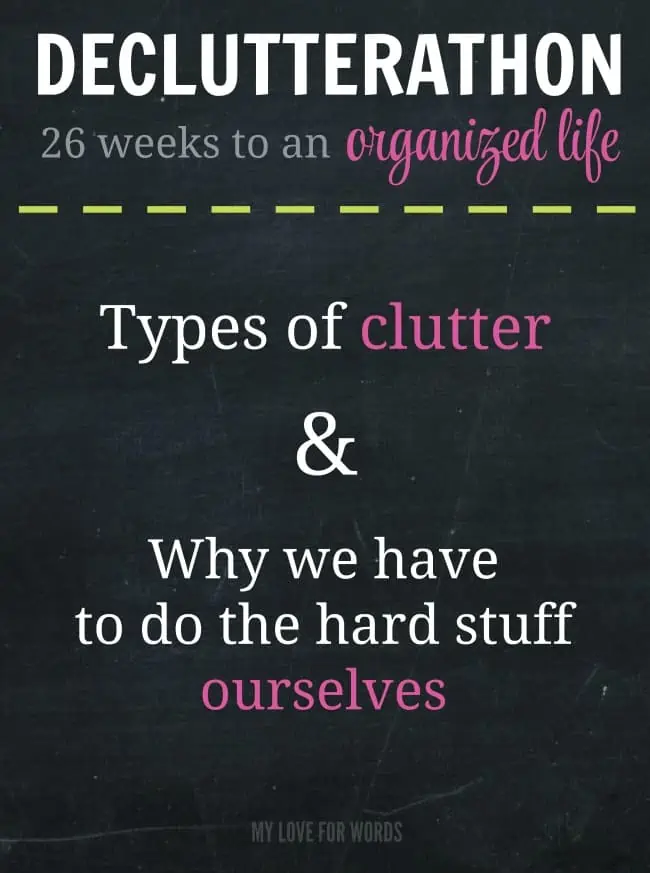
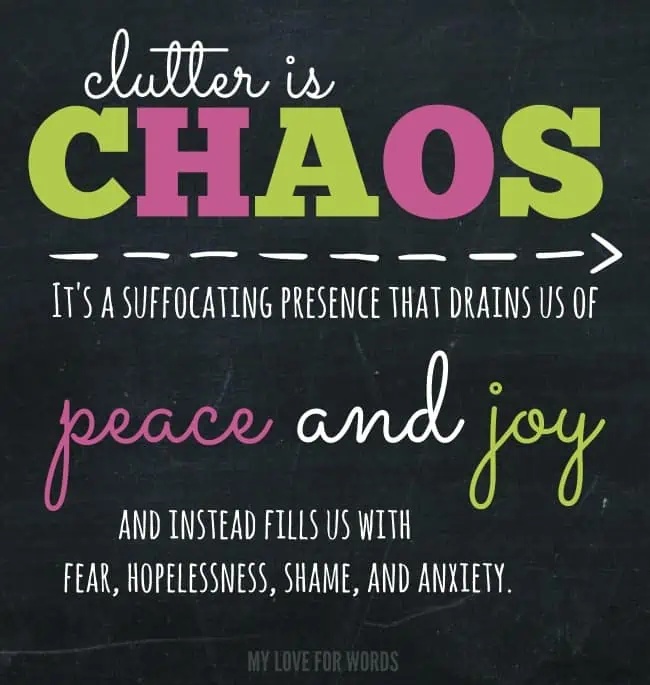
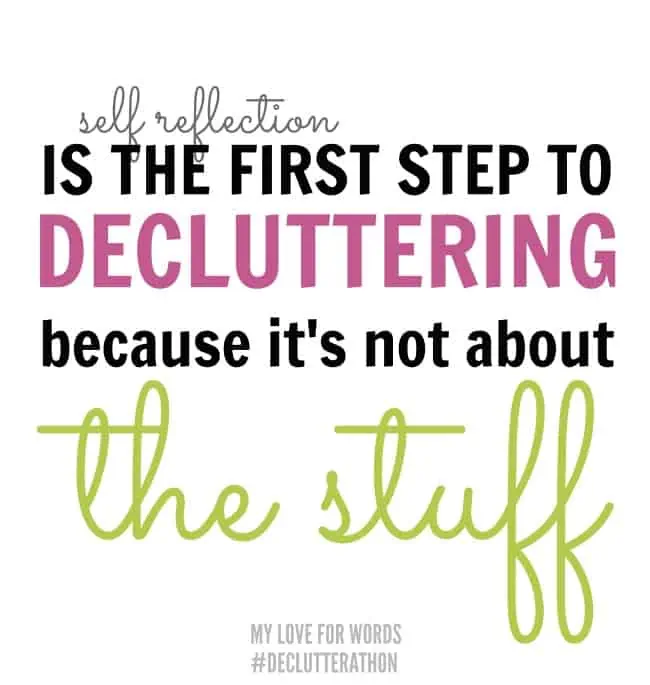
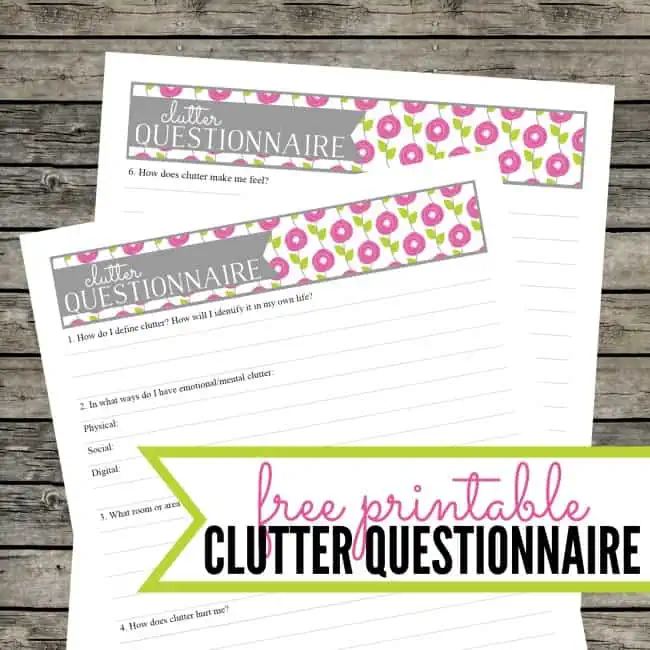




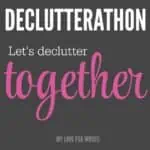
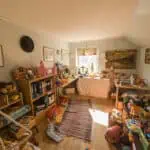

Leave a Comment